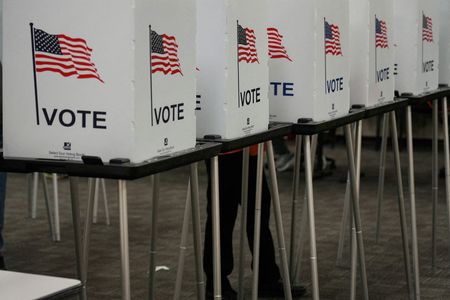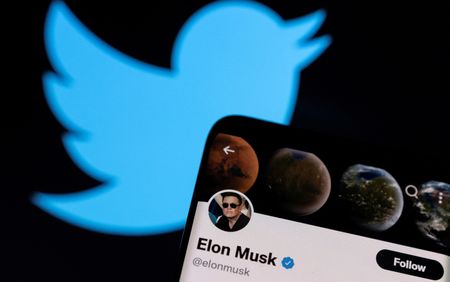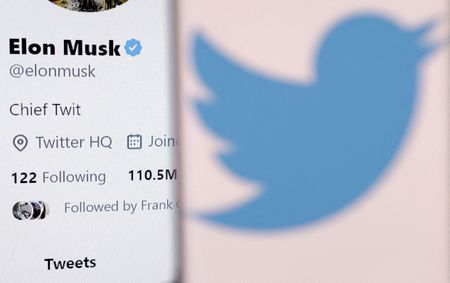 1
1 1
1



By Joseph Ax
(Reuters) -With the U.S. midterm elections less than two weeks away, Elon Musk’s $44 billion acquisition of Twitter could unleash a fresh wave of election misinformation just as voters are casting ballots that will determine control of Congress for the next two years, political and media experts say.
Musk, the CEO of electric car maker Tesla, says he is a free speech “absolutist” and has vowed to loosen the reins on chatter within the social media app, which in recent years had striven to limit toxic content it viewed as dangerously false or discriminatory even as its global influence has widened.
Musk sought to address fears on Thursday, telling Twitter advertisers that the platform “cannot become a free-for-all hellscape, where anything can be said with no consequences!” On Friday, the entrepreneur announced he would form a “content moderation council with widely diverse viewpoints.”
But Musk has voiced skepticism about the site’s permanent bans of figures such as former President Donald Trump, who lost his account – and its nearly 90 million followers – shortly after the Jan. 6, 2021, attack on the U.S. Capitol by a mob of his supporters. Trump had used his account to assert falsely that the 2020 election was stolen from him.
Musk has also criticized the site’s moderation policies in the past, and his plans to make major cuts to staff could hamstring the site’s ability to police its content, which it has struggled at times to do in the past.
“The bird is freed,” he wrote on Twitter after completing the acquisition on Thursday.
How much influence a more loosely moderated Twitter would have on political discourse in the run-up to the Nov. 8 general election is not clear. Early voting has already begun in a number of states, and polls show most voters have already made up their minds.
A more permissive Twitter could help to amplify false narratives around key election results in the days after Nov. 8 if some candidates refuse to accept the outcome and cry fraud as some fear may happen.
Republicans say many social media platforms are biased against them, and numerous conservative Twitter accounts – including Republican politicians – on Friday welcomed Musk’s takeover. Democrats fear that Trump supporters will promote far-right views or false claims of election fraud on Twitter if permitted.
The site has been a key political tool for years, offering politicians and activists around the world the ability to reach millions with largely unfiltered rhetoric. Twitter has played a role in organizing mass campaigns, including the #MeToo movement targeting sexual misconduct and the Arab Spring protests in the Middle East.
Critics, however, have warned that the site has also helped spread both misinformation – inaccurate or misleading information – and disinformation – purposefully false information – that undermines democratic principles and offers foreign actors an avenue for meddling.
“(Musk’s acquisition) could certainly create a much bigger pathway for disinformation agents to spread harmful information on the platform,” said Yosef Getachew, the director of the media and democracy program at Common Cause, the nonpartisan public interest organization.
“Content moderation policies are only effective if there are people there to enforce them and systems in place to ensure they are being enforced. If those rules are going to be out the window, that is going to be incredibly harmful.”
Polls show Democrats may be on the verge of losing their razor-thin majority in Congress on Nov. 8.
THE TRUMP QUESTION?
Since his ban, Trump has launched his own social media app, Truth Social, and has said he will not return to Twitter even if reinstated. On Friday morning, he posted to his 4.4 million followers on Truth Social, bragging that the app has “bigger numbers” than all other platforms, including Twitter, in an apparent indication that he does not intend to switch.
“I am very happy that Twitter is now in sane hands, and will no longer be run by Radical Left Lunatics and Maniacs that truly hate our country,” he wrote, before adding, “I LOVE TRUTH!”
Following the 2016 presidential election, when U.S. security agencies concluded that Russia had surreptitiously used social media to mount influence campaigns aimed at manipulating the outcome, Twitter and other social media sites ramped up their efforts to prevent the spread of misinformation, with mixed success.
Twitter sought to eliminate false tweets about the coronavirus pandemic, when misinformation about the scale of the disease and the efficacy of various medical treatments – exacerbated by some political leaders – spread widely, hampering the public health response.
In the aftermath of the 2020 election, Twitter permanently banned Trump and some of his allies, such as attorney Sidney Powell and pillow entrepreneur Mike Lindell, who echoed his false election fraud claims. The site has also deleted thousands of accounts affiliated with right-wing extremist groups such as the Proud Boys and the far-right conspiracy theory known as QAnon.
But some experts have questioned whether those efforts are adequate given the sheer volume and speed of misinformation online. A company whistleblower said earlier this year that Twitter had prioritized user growth over reducing spam and bots; the company rejected his account.
Conservatives have accused the site of censoring their view points for political reasons, an allegation Twitter has denied.
Marjorie Taylor Greene, the Republican Georgia congresswoman and Trump acolyte whose personal account was banned permanently in January for spreading false information about COVID-19, tweeted, “FREEDOM OF SPEECH!” from her official congressional account on Thursday.
Rapper Kanye West, whose Twitter account was suspended for posting anti-Semitic remarks, appeared to be active again on Friday.
(Reporting by Joseph Ax; editing by Ross Colvin and Alistair Bell)